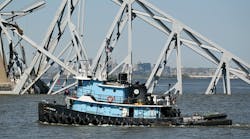In April, this column began with the words “I am so upset, I just don't know where to begin.” That comment was uttered by an NTSB member after listening to the post-investigation report of a fatal April 2003 dump truck crash in Glen Rock, PA.
The crash occurred when an overloaded, medium-duty dump truck — owned by a small private landscaping firm — lost its brakes on a steep downgrade. Cause of the crash was determined to have been “lack of oversight” that resulted in an untrained driver improperly operating an overloaded vehicle with inadequately maintained air brakes.
Now, news of a horrific August 15th truck crash has driven me to a similar frustration level. Accounts indicate this crash occurred on the New Jersey Turnpike near the approach to the George Washington Bridge when a tractor-trailer failed to slow as it approached traffic congestion. Apparently, the truck collided with a car, overturned onto a second car and pushed both cars into another truck. Four people were killed, including three members of one family; four others were severely injured.
My frustration is that the “small motor carrier oversight” issues surrounding this crash are eerily similar to the events of the April 2003 Glen Rock crash, as reported by the NTSB.
A review of press accounts and available government safety data related to this most recent crash indicate:
-
It was a “one-truck-one-driver” operation.
-
The truck driver was cited for careless driving.
-
The driver had been previously cited for careless driving after causing a similar crash four years ago.
-
Four of the truck's 10 brakes were cited as defective during a post-crash inspection.
-
The company was first granted operating authority in February 2005.
-
The operation had not undergone an on-site FMCSA safety review as of this writing
The similarities of these crashes point to two primary issues. First and foremost is the issue of at-risk driver behavior. In both instances, careless and/or untrained drivers were operating vehicles outside of acceptable safety limits. Research clearly demonstrates that driver safety history is an accurate predictor of future crash involvement. We must redouble driver oversight efforts if we want to achieve significant reductions in the frequency and severity of truck crashes.
Second is the issue of inconsistent national and state safety oversight of smaller and/or new entrant motor carrier operators. An alarming number of crashes are attributable to firms operating five or fewer vehicles. Unfortunately, routine on-site reviews of these operations are unfeasible, since the size of the small/new entrant population exceeds the available state and federal enforcement resources.
In 1995, two noted truck safety researchers, Leon Moses and Ian Savage, pointed out the need to improve the safety oversight of small and/or inexperienced motor carriers. While the 2003 enactment of "new entrant” safety oversight rules was an important first step, the two cases I talk about here underscore the need for additional measures.
Currently, FMCSA is undergoing a comprehensive review of its safety rating and measurement systems in an initiative entitled CSA 2010. I urge trucking, as well as state and federal safety enforcers, to use this current review as an opportunity to address the issues that attributed to these horrific truck crashes.
Jim York is the manager of Zurich Service Corp.'s Risk Engineering Transportation Team, based in Schaumburg, IL.


